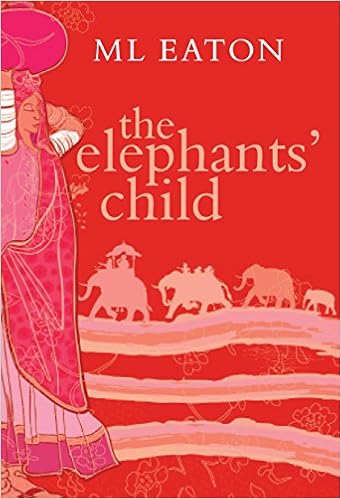On occasion I get permission from my fellow bloggers to repost one of their reviews. Today is one of those days. Say hello to M.L. Eaton, writer of mystery thrillers with a supernatural twist. Her novel The Elephants' Child was reviewed in Before the Second Sleep blog.
______________________
One of the first things I noticed about M.L. Eaton’s The Elephants’
Child when I initially received it, was its modest volume. This didn’t take
away from what I expected it might be, but the contrast between its size and
the story power packed inside becomes a delightful discovery.
Set in post-Partition India, The Elephants’ Child is mostly
six-year-old Melanie’s story, though told in omniscient third person with brief
forays into others’ perceptions. This works well because readers are able to
get a grip on what is happening in the “adult world” while remaining anchored
in Melanie’s. At times Eaton chooses to blend the two beautifully, capturing a
resulting understanding of where the young girl acquires some of her own
thought patterns, but with her own will intact.
“Now Lakshmi was there,
insisting on holding her hands to make sure she was safe: which was mostly nice
but often a bit of a nuisance because Melanie wanted to run and play hide and
seek in the gardens and not walk properly like a little lady.”
Melanie and her family shift from Karachi to Bombay (present-day Mumbai)
when her father assumes a new position in a civil engineering project. The
little girl has had to say goodbye more times than she cares to remember,
including initially from her native England, and has a difficult time
adjusting. Moreover, she tries to reconcile grown-up behavior—“Adults were such
peculiar things: they pretended nearly all the time”—with their words,
an endeavor she finds utterly confounding. A poised and intelligent girl,
however, she draws her own conclusions, including when to trust they were
indeed telling the truth, evoking her very early childhood when her father
introduced her to the peculiar elephants and promised they were real.
With a natural affinity for animals, Melanie develops particular fondness
for the huge, grey creatures at the Hanging Gardens, where her new ayah
takes her. Over some time her patience and the elephant mother’s trust develop
and the bond between creatures and human solidifies. Melanie experiences an
awakening, with an attending greater happiness, as well as a unity in spirit
with the elephants.
This coincides with the illness and scheduled surgery of Elizabeth,
Melanie’s mother, and the young girl’s fears for her mother play out in dreams
of elephants and their deaths. She herself experiences a setback and her ayah,
Lakshmi, immerses her more deeply into the culture by teaching her about the
elephant-headed god, Ganesha, who removes obstacles, including those within.
She instructs her in the mantra, Om Gum Ganapatayei Namaha, an appeal to
the god, though later worries what the memsahib will think of this.
Through the book Eaton weaves a theme of unity, her skill often apparent
given the seeming opposites she is joining together: humans and animals,
sadness and joy, a child in an adult world, the meeting of mono- and
polytheistic cultures. It is even more telling of her talent that she
accomplishes the feat without any person or creature having to compromise who
they are.
Another technique that stands out to great effect is Eaton’s ability to
utilize descriptive language in a way that awakens readers’ senses as she lays
out any given scene. Perhaps the best example is one that introduces Melanie
herself to her new home via the Gateway to India:
“Ahead of them stretched
a magnificent panorama. The sapphire sea filled the wide deep bay of the
natural harbour, framed by the lush green of the mountains on the mainland. The
harbour itself was studded with islands, like precious stones of emerald and
jasper in a sea of liquid lapis lazuli, a shimmering deep blue flecked with
gold and dotted with white diamonds—the sails of innumerable small craft
skipping across the sea’s sparkling surface.”
In just over 100 pages, Eaton composes a small treasure of words, woven into
a portrait taking us back to a time when, indeed, all was not perfectly wed,
but where the willing could find some unity in their surroundings and take with
them remembered pieces of a land that, because it in part grew them, becomes
part of their soul. This is the case for Melanie, despite her struggles as laid
out so poignantly by the author.
It is also the sort of book that beckons for a re-read and, I suspect, will
reveal an additional something every time. Each discovery of the memoir
contained within will glisten in readers’ own memories as they reach for the
stories, not unlike digging into Mary Poppins’s small but deeply-packed bag of
rich treasures brought out to enchant and unify purpose, being and wonder.
Presented with simplicity, but certainly not simple, no matter readers’ ages,
genre preferences or unfamiliarity with the content, it is a precious and
timeless keepsake for any bookshelf.



No comments:
Post a Comment